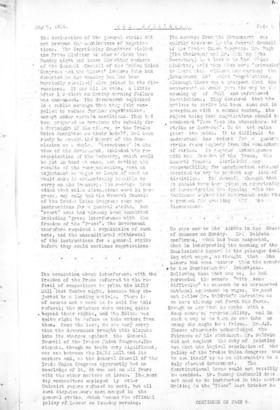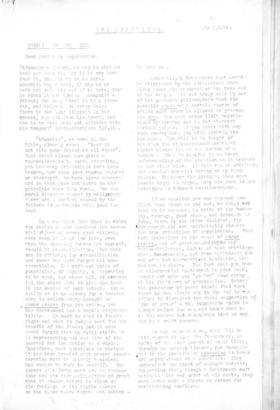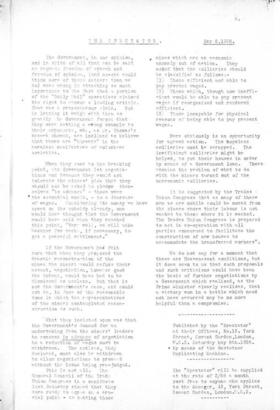rt0 pass now to the debiite in thoBouse of Commond'Ori
-Monday. Mr Baldwin confirmed., esehat had be'en suspected that-. in interpreting the meaning, of the Commissions -Repor':: in' the passages dep.' ing with wages,' no thought, that • the miners had come 'nearer t-an the owners
to :tee COmmissionerri iht
-• Believing that that was so, he had persuaded the Owner's "rith,„..some difficulty" to consent to an Unreserved national agreement on wages. We •need not follow Er. Baldwinrs nar'rative as we haee already set forth the ,facts. Enough to i,,ay that: he spoke -:with a .:
• deep sense. el responseility, and in
• such a way a.T to tarn no one into an enemY who might be' a friera,.. Thomas afterwards acknowlekroed the • fairness of. his St:Q.-tow:int . _ 4 Baldwin
• -did not neglect the duty of pointing • out that the logical conclusion of the policy of the Trades Union Congress was to set itself 'up as an alternative to a
• duly elect ed GOvernment . The Constitutional issue could not possibly avoiclOci. Mr. Ramsay MacDonald does.: not need tobe instructed in this r..atter
• .Writing fn the "Times" last October he
TOPICS C'F 7JE ny. Good.tntest in rsegeiation.
"Admonish a .7e-iend, it may be that he hath not flor.e it, and if he may have done it, thst he dc it-no mere. Admonish thy fsiend, it may be he hath not saiS it; and if he have, that he speak it net again. _Admonish a friend; for meey times it is a slander, and beliese ot every tale. There is one :.nat slippeth in his speech, but cot fromhis heart; and • who is he that hath not offended with his tongue?" (Esclesiasticus X1X.13).
"Admcnish", as used in the Bible, clo6rly means 'Have it • out with your friend at all costs". That seems almost too great a coa.71.onplace to be Worth recording; yet hew many friesdships have been broken, how many good cauims• injured or destroyed, beeausethese concerned in them have tot acted on the principle here laid down.. For one moral dieast•sr caused by malignancy there are a hurdeed caused,by the failure to ne7etiate with good intent, In a.c.orni(:t like. that in which the nation i now'InVolved the essential object oi every good citizen,even when it Coeks:too late, even when the oppecitg forces are engaged, should be reeonsiliation. But when one is strivitg for econciliation and peace one must forget all nonessentials. One must not think of punctiliec, of dignity, '.e appearing to be weak, and above all, of expecting the other side to gisee the lead' in the matter of goad intent. Espe .cially is it neeezsary for a Govern ment to banishevery thought of amour.propre from its action, for the Government has a'double rosponni; bility. It must do what it thinks right and what it judges best for the benefit of the State; but it must never forget that in civil strife it is representing not one side•of the quarrel but the nation as d whole. Therefore, such questions as whether it has been treated. with proper consideration must be utterly bsnished. .
One cannot be rude to oneself. The powers of a Go-xerement are so tremendous and its respsnsil-,ilities so greats that it cannot afford to think of its feelings or its rif„thts. except. ' on the plane -seeee rights and duties be ceme one.
Above all. A Goveenmsnt must never be frightened by the sophistries that. sling round the argument of the thin end of the wedge. It was truly said by.one of-the grsateet philosophers that the possible abuse of a certain 'course of action must never be allowed to prevent its use. You must never limit negotia .tions by barring out in the abstract certain points.. IT you start with any such conception, you. willimperil, the business. You will be in danger of cresting the mius,derstandings'hieh almost always lie at tie bottom of a dispute. Whst is needful is an exact . understanding of the position as it aiprars. to the other side, If this ran be obta*ned, the eonelueions will spring up by themselves. Whstever the pledges,'Tthen once .people begin to ergue,.thoy are sure to get entangled in te.booed. considerations.
If we ceneider how the present 3onflint same about in the end ,.we shall eco that it is because, in •spite of the human.ity, courage, good sense, and devotion :.o duty, shown by the Prime Minister, the %Government did not sufficiently observe the true principles of negotiation. They lost themselves in the sands of amour propre, and of goverumentelrights anti:— responsibilities, infine of that privilege. whicn Governments, not from wickedness„ but out of a. had hierarchis.al tradition; are too apt to claim. The fact that .you have an all-powerful instrument in your hand, ' should net make you "go. foe-your. enemy at his first art of provocation. Rather . the possessor of power should feel that since he nan always win in the end he an afford tc—disregerd the fatal suggestion of ''Now or never" the suggestion which is always before the men who kncrs that he i7 the weaker but calculates that he may win by a swift poLnce.
In the presert nese, wsP....LI ill Us regret is that the Government, in -spite of the f-oed intent of their Chief, throUgh an unhaT.Ty blunder, put themseleves in the position of appearing to break off negotiations en a punctilio. They 'emphasized the point of alleged threats, forgetting that, though a Government must . maintain law and order at all .costs, they must never make a threat an excuse for anticiTating conflict. The Government, in our opinions and in spite of all that can be Said as regards freedom of speech and freedom of opinion, (and no-one could think more of these matters than we do) were wrong in attaching so much importance to the fact that a portion of the "Daily Mail" operatives claimed the right to censor a leading. article.
That was a preposterous claim. But in letting it weigh with them so greatly ehe Government forgot that they were setting a wrong example to their.opponarts, whc, as Yr. Thomas's speech showed, are inclined to believe that there are "threats" in the harmless manifestoes of volunteer societies.
When they came to the breaking point, the Government let negotiations end because they would not tolerate the miners' plea that they 'should not be asked to pledge themselves "in advance" those were the essential words, to a decrease of wages. Considering the money we have spent on the subsidy already, one would have thought that the Government would have said when they reached . this point, "Ver:well, we will take 'another feu weeke, if necessary, to get a peaceful settlement."
If the Governmert had felt sure that When they proposed the drastic reconstruction of the mines the miners would refuse their assent, negotiation, howee.er good the intent, would have had to be dismissed as useless. But that is not the Government's case, and could not be, in face of the reasonable tone in which the representatives of the miners contemplated reconstruction as such.
What they insisted upon was that the Government's demand for an undertaking from the miners' leaders to consent in advance of negotiation to a reduction of wages must be withdrawn. The notices, they declared, must also be withdrawn to allow negotiations to proceed without the issue being pre-judged.
This is not all. The General Council of the Trade Union Congress in a manifesto last Saturday showed that they were ready to are on a crucial point to putting those mines which are an economic • anomaly out of action. They asked that the collieries should be classified as follows: (1) Those efficient and able to pay present wages.
(2) Those which, though. now inefficient would be able to pay present wages if reorganized and rendered efficient.
(3) Those incapable for physical reasons of being able to pay present wages.
Here obviously is an opportunity for agreed action. The hopeless collieries must be scrapped. The inefficient collieries might be .helped, to put their houses in order by means of a Government loan. There_ remains the problem of what to do with the miners turned Out of the uneconomic collieries.
It is suggested by the Trades • Union Congress that as many of these men as are mobile could be moved from the places where their labour is not wanted to those where it is wanted. The Trades Union Congress is prepared to act in co-operation with all parties concerned to facilitate the construction of new houses to accommodate the transferred workers".
We do not say for a moment that these are Heaven-sent conditions, but it does seem to us that such proposals and such criticisms could have been the basis of further negotiations by a Government which realized, as the Prime Minister clearly realises, that a victory won in a battle which need not have occurred may be no more helpful than a compromise.












 Previous page
Previous page